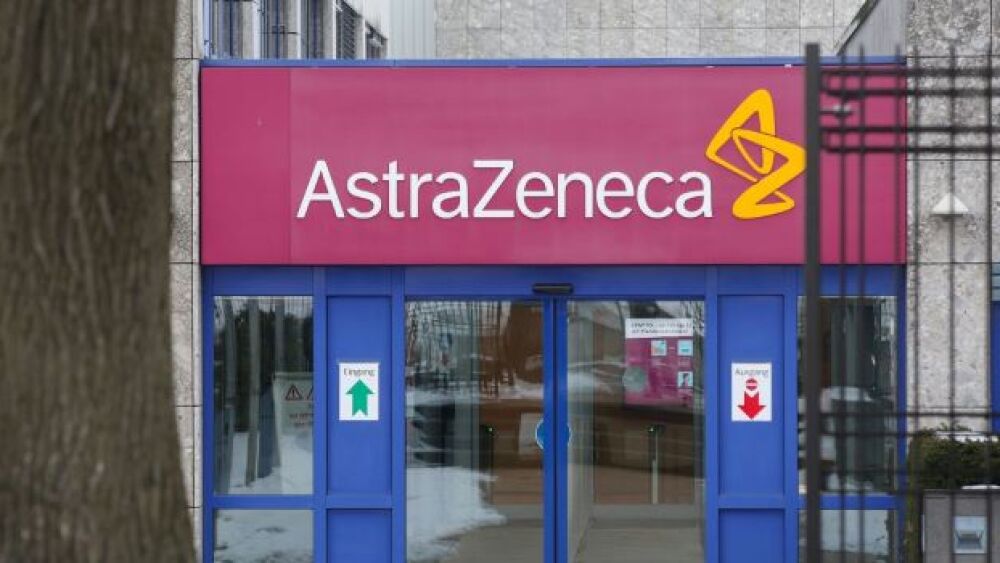AstraZeneca’s rare disease subsidiary Alexion posted positive late-stage results from a potential complementary treatment for paroxysmal nocturnal hemoglobinuria.
Courtesy Bodo Marks/Picture Alliance via Getty Images
AstraZeneca’s rare disease subsidiary Alexion posted positive late-stage results from a potential complementary treatment for paroxysmal nocturnal hemoglobinuria (PNH), a chronic and potentially life-threatening blood disorder.
On Friday, Alexion announced that danicopan, also known as ALXN2040, met the primary endpoint in the Phase III ALPHA study in PNH patients who experience clinically significant extravascular hemolysis (EVH). These results also mark the first positive Phase III results for a factor D inhibitor.
The data was taken at a prespecified interim analysis. The interim results demonstrate statistically significant improvement compared to placebo in hemoglobin levels from baseline after 12 weeks.
The data also showed danicopan plus Ultomiris generated statistically significant and clinically meaningful improvements across a number of markers. Those secondary endpoint markers include improvements in hemoglobin levels, transfusion avoidance and Functional Assessment of Chronic Illness Therapy (FACIT) Fatigue scores from baseline. The danicopan combination was evaluated against placebo plus Ultomiris or Soliris, two C5 inhibitors developed by Alexion for PNH.
Full data is expected to be presented at a future medical conference.
Marc Dunoyer, chief executive officer of Alexion, said the company has continued to push the boundaries when treating PNH.
Soliris, once known as the world’s most expensive drug, was the first PNH treatment developed. Ultomiris, a follow-up treatment, has become a standard of care for PNH, a disease that affects approximately one or two people out of every million.
“These are the first positive Phase III results for an oral factor D inhibitor and demonstrate the potential for danicopan add-on therapy to improve signs and symptoms and reduce the need for transfusions for the limited proportion of people living with PNH who experience clinically significant EVH,” Dunoyer said in a statement this morning.
Jong-Wook Lee, a professor in the hematology department at Seoul St. Mary’s Hospital of The Catholic University of Korea and an investigator in the ALPHA trial, noted that C5 inhibitors had proven themselves as treatments for PNH. However, he said a small percentage of these patients continue to struggle with issues like anemia and a “burden of transfusion due to clinically significant EVH.”
An Alexion spokesperson told BioSpace the company is encouraged by the interim high-level results from the ALPHA Phase III trial.
“Building on our pioneering leadership in complement inhibition, these data represent the first positive Phase III results for an oral factor D inhibitor,” the spokesperson said.
This was positive news for Alexion and the development of danicopan, an add-on therapeutic to C5 inhibitors. Two years ago, Alexion discontinued the development of danicopan in C3 Glomerulopathy following disappointing interim data from two Phase II studies.
At the time, Alexion noted the interim data from those studies suggested that inhibition of Factor D is a promising potential target for treating the cause of C3G. However, as BioSpace previously reported, trial data showed the clinical response from patients who received danicopan was suboptimal due to insufficient PK/PD response and incomplete inhibition of the alternative pathway.
For PNH, danicopan has received Orphan Drug designation in both the U.S. and Europe. Danicopan has also earned Breakthrough Therapy designation by the FDA and PRIME status by the EMA.
Alexion is also evaluating danicopan in a Phase II trial as a potential monotherapy for geographic atrophy, a condition associated with late-stage macular degeneration.
“We continue to evaluate the potential of targeting factor D for a variety of indications across several therapeutic areas where we have deep expertise, including hematology, nephrology, and neurology,” the Alexion spokesperson said.





